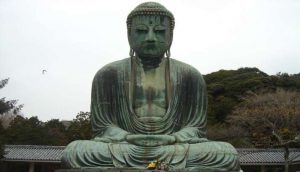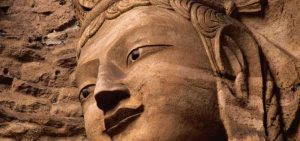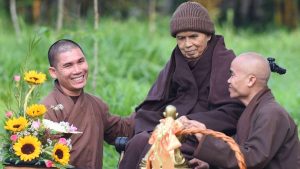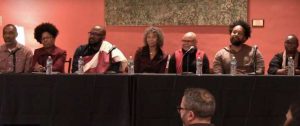
In his exegesis of the Deep Mind in the Commentary on the Contemplation Sutra, Master Shandao tells us how to establish deep faith in the context of a person, specifically the Buddha. He further outlines four scenarios of doubt that might impair, or even destroy a Pure Land practitioner’s faith when he is challenged by different kinds of sentient beings.
These four scenarios also serve as opportunities for Pure Land devotees to establish deep faith by standing firm in the face of these challenges. Thus, these four scenarios become a useful yardstick for measuring the depth of a practitioner’s faith.
In the first scenario, the “opponents” are Buddhist practitioners of different views and practices, be they monastics or householders. In the second, the challengers are bodhisattvas who have not reached the first stage, arhats and pratyekabuddhas. The third scenario includes bodhisattvas of the first stage or above, up to the 10th stage.
Who are the challengers in the fourth scenario of doubt? And what do they say that may impair, or even destroy a Pure Land practitioner’s faith?
The fourth scenario of doubt
Master Shandao writes concerning the fourth scenario of doubt:
“Practitioners should know that, though there appear buddhas in transformation and reward bodies (whether one, many, or so numerous as to fill all of space in the Ten Directions), each of them radiating light and stretching forth their tongues to cover all worlds; and should these buddhas proclaim: ‘It is a falsehood that Shakyamuni Buddha praised the Buddha Amitabha, and that he encouraged ordinary people to exclusively recite Amitabha’s name and to practice other virtues that they might be reborn in [Amitabha’s] land after this lifetime’—though I hear such words spoken by various buddhas, I would not give rise to a single thought of doubt or backtracking, nor would I be fearful of not attaining rebirth in that Buddha’s land.”
It turns out that the challengers in the fourth scenario of doubt are buddhas in their transformed and reward bodies! How is it possible for an ordinary being to maintain their faith in the face of opposition from fully enlightened buddhas?
We need not despair. While it is true that ordinary beings lack the wisdom to differentiate true sages from false, it bears remembering that a buddha’s golden words are truths that never contradict the words of other buddhas. One buddha’s teaching is the teaching of all buddhas, and vice-versa. If one is a true buddha, one will not say something that contradicts Shakyamuni Buddha’s teaching in the Amitabha Sutra.
Doubt in the teaching of Amitabha-recitation
There are two kinds of doubt: one is doubt in the teaching of Amitabha-recitation, and the other is doubt in oneself. These doubts reflect the first two kinds of determinant deep faith (faith in Amitabha’s vows, and belief in one’s meager spiritual capacities), as discussed previously.
What does it mean to doubt the teaching of Amitabha-recitation? Everybody knows how to recite the six-character Name (“Namo Amitabha” or “Namo Amituofo”). How can an ordinary being be reborn in Amitabha Buddha’s Land of Bliss through the sole practice of Amitabha-recitation? How can one receive such a splendid reward through this simple and easy practice? It is impossible! It is too incredible to believe!
As the result of such doubts, practitioners may opt to cultivate various virtues with their own power, such as meditative practices to purify the mind, in addition to the practice of Amitabha-recitation. In this way, they may hope to have a greater chance of attaining rebirth or to be reborn in a higher level of the nine lotus stages. This situation resembles that of those who harbor doubts in the Buddha’s wisdom, as relayed in the passage on “rebirth by womb” in the Infinite Life Sutra.
Such practitioners doubt the six-character Name, which is the Dharma Body of Amitabha Buddha himself, or the real form body as said by Master Tanluan. They doubt the adequacy of the Name’s merits and virtues for assured rebirth in Amitabha’s splendid reward land. Thus, they prefer to practice various meditative and non-meditative virtues, rather than exclusively recite Amitabha’s Name.
Doubt in oneself
Perhaps the more difficult doubt to overcome is doubt in oneself. One believes the teaching of Amitabha-recitation and deliverance through Amitabha’s Fundamental Vow, but he is acutely aware of his status as an ordinary, iniquitous being. He worries that he is inferior and not “qualified” for rebirth, even though he exclusively recites Amitabha’s Name.
As a result, he may try to accumulate virtues to clear his own personal karmic offenses, or purify his body of the three karmas in the Saha world prior to rebirth in the Land of Bliss. This situation is also similar to those who doubt the Buddha’s wisdom in the passage on “rebirth by womb” in the Infinite Life Sutra.
Such persons doubt great compassion of Amitabha as said by Master Tanluan in the Commentary of the Treatise of Rebirth. They also doubt the transcendental versatility of Amitabha’s merits and virtues that encompass both the impure Saha world and the Land of Bliss; the present life and the future one as well. Hence, they mix various meditative and non-meditative virtues, rather than exclusively recite Amitabha’s Name for the attainment of rebirth.
Amitabha’s Name is real and permanent, and Amitabha’s deliverance is equal and unconditional; therefore, we should establish faith in the practice of Amitabha-recitation. The Name contains both faith and practice, and is accessible to sentient beings of all capacities, including the most iniquitous beings. On the matter of assured rebirth in Amitabha’s Land of Bliss, we should not pre-judge the teaching of Amitabha’s deliverance based on our feelings, as these are changeable and unreliable.
When it comes to rebirth, we need not consider our qualifications or aptitude. We need only ask ourselves whether or not we believe in Amitabha’s Fundamental Vow. Those whose belief is made concrete through the exclusive practice of Amitabha-recitation will assuredly be reborn. Those whose doubts prevent them from practicing must wait until their karma ripens sufficiently for them to rely on Amitabha’s unconditional compassion . . . whether in this lifetime, or a future one.











